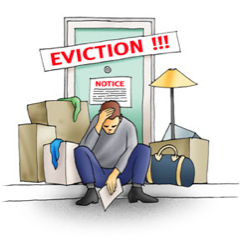
By Carly R. Wright, Staff Editor
Last year, the New York Times published a Princeton University study on eviction rates in the U.S. that revealed something troubling: The City of Richmond had the second highest eviction rate in the country.[1] In 2016, one in nine Richmond families were evicted through legal action and one in five were threatened with eviction.[2] Moreover, over 30% of Richmonders receive an eviction notice in any given year.[3]
Troubled by these numbers, Richmond Mayor Levan Stoney proposed a solution early this year: a Diversion Eviction Program.[4]According to Mayor Stoney, this program provides evictees with a “clean slate” by helping tenants avoid an eviction on their rental history while guaranteeing landlords are paid back the money they are owed using a payment plan.[5] Eligible tenants may receive financial assistance in paying back money owed to landlords.[6] The program utilizes pro bono attorneys who act as mediators between tenants and landlords, and provides mandatory financial literacy courses.[7] Tenants are eligible for this program only once, and would be able to stay in their homes while paying their rental debt.[8]
Richmond City Council recently approved a $485,140 grant to finance the program.[9] The grant goes towards Housing Opportunities Made Equal (HOME), a nonprofit fair housing organization, who will implement and oversee the program.[10] The grant will also be used to help families facing evictions pay off up to 50% of their arrearages. To qualify for the Diversion Eviction Program, a tenant must only have two late payments in six months, or three in twelve months.[11] They must pay 25% of their back rent when the court hears their case, followed by paying off the remaining amount within 90 days, and paying monthly rent on time.[12] The landlord must also agree to participate.[13]
This program could prevent not only the evictions of vulnerable individuals and families, but the aftermath of them as well.[14] Eviction leads to financial instability and the possible loss of government programs, such as SNAP and Medicaid benefits, because individuals do not have an address to put on applications.[15] The loss of a permanent address has other far-reaching effects. When families are evicted, oftentimes they resort to homeless shelters for housing.[16] When children have to get to school and the parent(s) do not have their own personal transportation, they have to ride the bus, even though a bus may not come to that shelter.[17] Richmond Public Schools have had to adjust bus routes to accommodate for these children and ensure they get to school.[18]
While only a small number of people will be reached through this program because of its prerequisites, it is a start to solving the eviction crisis in Richmond. While the Richmond program goes underway, the Commonwealth of Virginia has also passed a pilot program geared towards the same types of renters.[19] On the list of cities with the highest eviction rates, Virginia held five of the top ten spots, and the legislation is set to improve these numbers.[20] Although eviction is a complex issue with many causes and effects, the state legislature, along with organizations dedicated to fair and equitable housing, are working on solutions.
[1]SeeEmily Badger and Quoctrung Bui, In 83 Million Eviction Records, a Sweeping and Intimate New Look at Housing in America, New York Times (April 7, 2018).
[2]Id.
[3]Id.
[4]Sara McCloskey, Richmond On Track to Launch Virginia’s First Eviction Diversion Program, As State Works On Its Own, ABC News (May 30, 2019).
[5]Id.
[6]Id.
[7]Id.
[8]Id.
[9]Jeremy M. Lazarus, HOME to Begin Eviction Diversion Program, Richmond Free Press (Sept. 6, 2019 at 6AM).
[10]Id.
[11]Id.
[12]Id.
[13]Id.
[14]Sean Galvin, Richmond Tackles City’s Eviction Crisis with New Grant, The Dogwood(Sept. 18, 2019 at 2:23PM).
[15]Id.
[16]Id.
[17]Id.
[18]Id.
[19]H.B. 2655, 2019 Gen. Assemb., Reg. Sess. (Va. 2019).
[20]SeeEmily Badger and Quoctrung Bui, In 83 Million Eviction Records, a Sweeping and Intimate New Look at Housing in America, New York Times(April 7, 2018).
